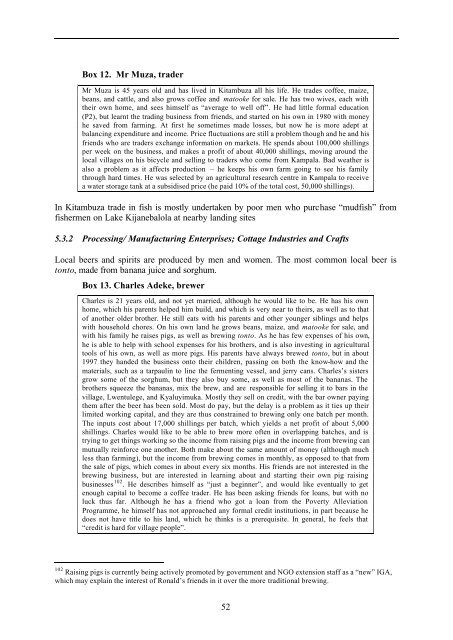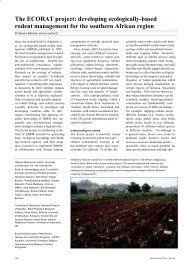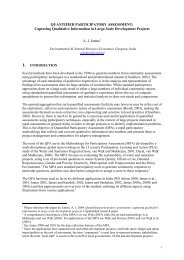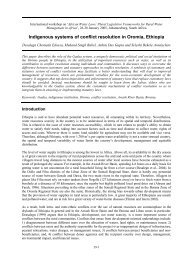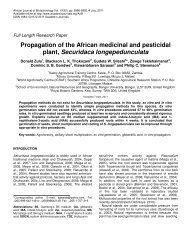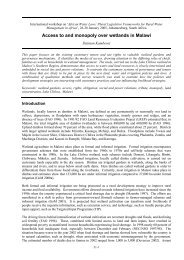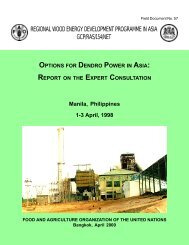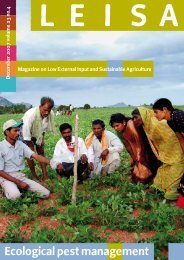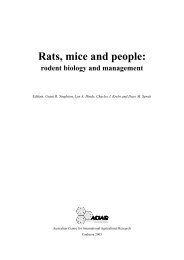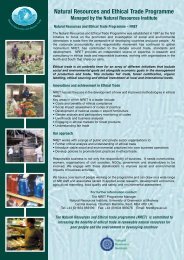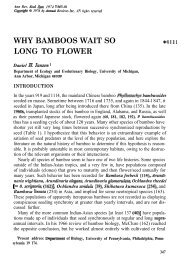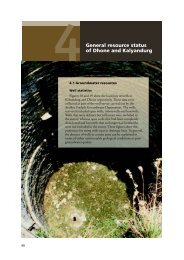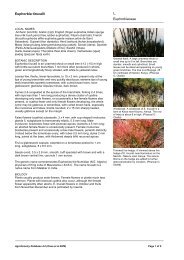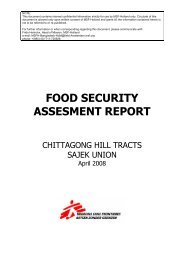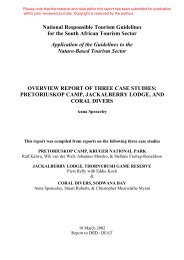Access to Rural Non-Farm Livelihoods - Natural Resources Institute
Access to Rural Non-Farm Livelihoods - Natural Resources Institute
Access to Rural Non-Farm Livelihoods - Natural Resources Institute
You also want an ePaper? Increase the reach of your titles
YUMPU automatically turns print PDFs into web optimized ePapers that Google loves.
Box 12. Mr Muza, trader<br />
Mr Muza is 45 years old and has lived in Kitambuza all his life. He trades coffee, maize,<br />
beans, and cattle, and also grows coffee and ma<strong>to</strong>oke for sale. He has two wives, each with<br />
their own home, and sees himself as “average <strong>to</strong> well off”. He had little formal education<br />
(P2), but learnt the trading business from friends, and started on his own in 1980 with money<br />
he saved from farming. At first he sometimes made losses, but now he is more adept at<br />
balancing expenditure and income. Price fluctuations are still a problem though and he and his<br />
friends who are traders exchange information on markets. He spends about 100,000 shillings<br />
per week on the business, and makes a profit of about 40,000 shillings, moving around the<br />
local villages on his bicycle and selling <strong>to</strong> traders who come from Kampala. Bad weather is<br />
also a problem as it affects production – he keeps his own farm going <strong>to</strong> see his family<br />
through hard times. He was selected by an agricultural research centre in Kampala <strong>to</strong> receive<br />
a water s<strong>to</strong>rage tank at a subsidised price (he paid 10% of the <strong>to</strong>tal cost, 50,000 shillings).<br />
In Kitambuza trade in fish is mostly undertaken by poor men who purchase “mudfish” from<br />
fishermen on Lake Kijanebalola at nearby landing sites<br />
5.3.2 Processing/ Manufacturing Enterprises; Cottage Industries and Crafts<br />
Local beers and spirits are produced by men and women. The most common local beer is<br />
<strong>to</strong>n<strong>to</strong>, made from banana juice and sorghum.<br />
Box 13. Charles Adeke, brewer<br />
Charles is 21 years old, and not yet married, although he would like <strong>to</strong> be. He has his own<br />
home, which his parents helped him build, and which is very near <strong>to</strong> theirs, as well as <strong>to</strong> that<br />
of another older brother. He still eats with his parents and other younger siblings and helps<br />
with household chores. On his own land he grows beans, maize, and ma<strong>to</strong>oke for sale, and<br />
with his family he raises pigs, as well as brewing <strong>to</strong>n<strong>to</strong>. As he has few expenses of his own,<br />
he is able <strong>to</strong> help with school expenses for his brothers, and is also investing in agricultural<br />
<strong>to</strong>ols of his own, as well as more pigs. His parents have always brewed <strong>to</strong>n<strong>to</strong>, but in about<br />
1997 they handed the business on<strong>to</strong> their children, passing on both the know-how and the<br />
materials, such as a tarpaulin <strong>to</strong> line the fermenting vessel, and jerry cans. Charles’s sisters<br />
grow some of the sorghum, but they also buy some, as well as most of the bananas. The<br />
brothers squeeze the bananas, mix the brew, and are responsible for selling it <strong>to</strong> bars in the<br />
village, Lwentulege, and Kyaluyimuka. Mostly they sell on credit, with the bar owner paying<br />
them after the beer has been sold. Most do pay, but the delay is a problem as it ties up their<br />
limited working capital, and they are thus constrained <strong>to</strong> brewing only one batch per month.<br />
The inputs cost about 17,000 shillings per batch, which yields a net profit of about 5,000<br />
shillings. Charles would like <strong>to</strong> be able <strong>to</strong> brew more often in overlapping batches, and is<br />
trying <strong>to</strong> get things working so the income from raising pigs and the income from brewing can<br />
mutually reinforce one another. Both make about the same amount of money (although much<br />
less than farming), but the income from brewing comes in monthly, as opposed <strong>to</strong> that from<br />
the sale of pigs, which comes in about every six months. His friends are not interested in the<br />
brewing business, but are interested in learning about and starting their own pig raising<br />
businesses 102 . He describes himself as “just a beginner”, and would like eventually <strong>to</strong> get<br />
enough capital <strong>to</strong> become a coffee trader. He has been asking friends for loans, but with no<br />
luck thus far. Although he has a friend who got a loan from the Poverty Alleviation<br />
Programme, he himself has not approached any formal credit institutions, in part because he<br />
does not have title <strong>to</strong> his land, which he thinks is a prerequisite. In general, he feels that<br />
“credit is hard for village people”.<br />
102 Raising pigs is currently being actively promoted by government and NGO extension staff as a “new” IGA,<br />
which may explain the interest of Ronald’s friends in it over the more traditional brewing.<br />
52


